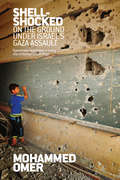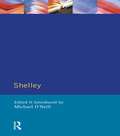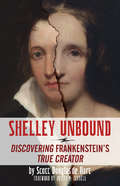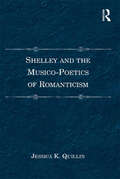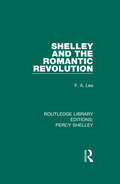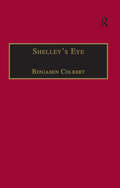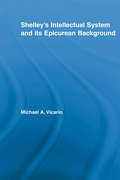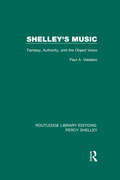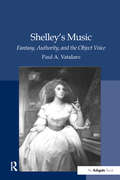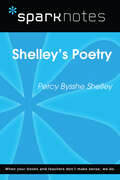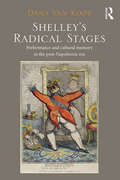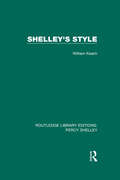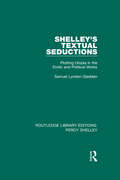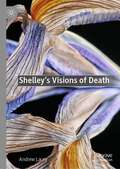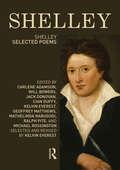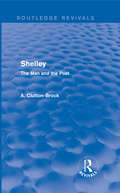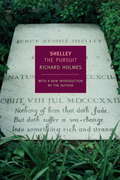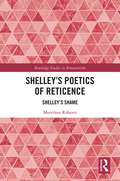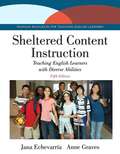- Table View
- List View
Shell Shock, Memory, and the Novel in the Wake of World War I
by Trevor DodmanShell Shock, Memory, and the Novel in the Wake of World War I explores the narrative traces, subaltern faces, and commemorative spaces of shell shock in wartime and postwar novels by Mulk Raj Anand, Ford Madox Ford, Mary A. Ward, George Washington Lee, Ernest Hemingway, F. Scott Fitzgerald and Christopher Isherwood. This book argues that World War I novels serve as an untapped source of information about shell shock, and renews our present understanding of the condition by exploring the nexus of shell shock and practices of commemoration. Shell shock novelists testify to the tenaciousness and complexity of the disorder, write survivors into visibility, and articulate the immediacy of wounds that remain to be seen. This book helps readers understand more fully the extent to which shell shock continues to shape and trouble modern memories of the First World War.
Shell-Shocked: On the Ground Under Israel's Gaza Assault
by Mohammed OmerOperation Protective Edge, launched in early July 2014, was the third major Israeli assault on the Gaza Strip in six years. It was also the most deadly. By the conclusion of hostilities some seven weeks later, 2,200 of Gaza’s population had been killed, and more than 10,000 injured. In these pages, journalist Mohammed Omer, a resident of Gaza who lived through the terror of those days with his wife and then three-month-old son, provides a first-hand account of life on-the-ground during Israel’s assault. The images he records in this extraordinary chronicle are a literary equivalent of Goya’s "Disasters of War”: children’s corpses stuffed into vegetable refrigerators, pointlessly because the electricity is off; a family rushing out of their home after a phone call from the Israeli military informs them that the building will be obliterated by an F-16 missile in three minutes; donkeys machine-gunned by Israeli soldiers under instructions to shoot anything that moves; graveyards targeted with shells so that mourners can no longer tell where their relatives are buried; fishing boats ablaze in the harbor. Throughout this carnage, Omer maintains the cool detachment of the professional journalist, determined to create a precise record of what is occurring in front of him. But between his lines the outrage boils, and we are left to wonder how a society such as Israel, widely-praised in the West as democratic and civilized, can visit such monstrosities on a trapped and helpless population.
Shelley (Longman Critical Readers)
by Michael O'NeillAttacked by T.S. Eliot and F.R. Leavis, Shelley's poetry has, over the last few decades, enjoyed a revival of critical interest. His radical politics and arrestingly original poetic strategies have been studied from a variety of perspectives - formalist, deconstructionist, new historicist, feminist and others. Of all the Romantics, Shelly has benefited most from the so-called 'theoretical revolution', as is borne out by the wide range of recent critical work represented in this volume. The 134 essays selected analyse many of Shelley's finest poems, including Alastor, Julian and Maddalo, Prometheus Unbound, Adonais and The Triumph of Life. Michael O'Neill's informed Introduction explores the contours of this debate. Detailed headnotes to the individual essays, explanations of difficult terms, and a further reading section provide invaluable guides to the reader. This collection illuminates the enduring and contemporary significance of the work of a major poet.
Shelley Unbound: Discovering Frankenstein's True Creator
by Joseph P. Farrell Scott D. de HartFrankenstein was first released in 1818 anonymously.The credit for Mary Wollstonecraft Shelley's authorship first occurred in 1823 when a French edition was published.<P><P> A year earlier, Mary's revolutionary husband, the influential poet, dramatist, novelist, and essayist Percy Bysshe Shelley, died.The same year Frankenstein, or, The Modern Prometheus (its full title) was first published, so was another work by Mary's husband that shares use of the word Prometheus. The drama Prometheus Unbound was indeed credited to Percy Shelley.The secret admission of many experts in English literature is that Mary Wollstonecraft Shelley did not write a good portion of Frankenstein. In Shelley Unbound, Oxford scholar Scott D. de Hart examines the critical information about Percy Shelley's scientific avocations, his disputes against church and state, and his connection to the illegal and infamous anti-Catholic organization, the Illuminati.Scott D. de Hart's fascinating investigation into Frankenstein and the lives of Mary Wollstonecraft and Percy Shelley results in an inconvenient truth regarding what we have long believed to be a great early example of the feminist canon.Scott D. de Hart was born and raised in Southern California. He graduated from Oxford University with a PhD specializing in nineteenth-century English literature and legal controversies.
Shelley and the Apprehension of Life
by Ross WilsonPercy Bysshe Shelley, in the essay 'On Life' (1819), stated 'We live on, and in living we lose the apprehension of life'. Ross Wilson uses this statement as a starting point to explore Shelley's fundamental beliefs about life and the significance of poetry. Drawing on a wide range of Shelley's own writing and on philosophical thinking from Plato to the present, this book offers a timely intervention in the debate about what Romantic poets understood by 'life'. For Shelley, it demonstrates poetry is emphatically 'living melody', which stands in resolute contrast to a world in which life does not live. Wilson argues that Shelley's concern with the opposition between 'living' and 'the apprehension of life' is fundamental to his work and lies at the heart of Romantic-era thought.
Shelley and the Musico-Poetics of Romanticism
by Jessica K. QuillinAddressing a gap in Shelley studies, Jessica K. Quillin explores the poet's lifelong interest in music. Quillin connects the trope of music with Shelley's larger formal aesthetic, political, and philosophical concerns, showing that music offers a new critical lens through which to view such familiar Shelleyan concerns as the status of the poetic, figural language, and the philosophical problem posed by idealism versus skepticism. Quillin's book uncovers the implications of Shelley's use of music by means of four musico-poetic concerns: the inherently interdisciplinary nature of musical imagery and figurative language; the rhythmic and sonoric dimensions of poetry; the extension of poetry into the performative realms of the theatre and drawing room through close links between most poetic genres and music; and the transformation of poetry into music through the setting and adaptation of poetic lyrics to music. Ultimately, Quillin argues, Shelley exhibits a fundamental recognition of an interdependence between music and poetry which is expressed in the form and content of his highly sonorous works. Equating music with love allows him to create a radical model in which poetry is the highest form of imaginative expression, one that can affect the mind and the senses at once and potentially bring about the perfectibility of mankind through a unique mode of visionary experience.
Shelley and the Romantic Revolution (RLE: Percy Shelley #3)
by F.A. LeaFirst published in 1945. In this work the author seeks to correct the misinterpretation and incorrect labelling of Shelley’s thought. While not neglecting Shelley as a poet, this book focuses on his contributions made to the general movement of political and philosophical thought of his era and by so doing his relevance to contemporary issues. This title will be of interest to students of literature.
Shelley's Eye: Travel Writing and Aesthetic Vision (The Nineteenth Century Series)
by Benjamin ColbertPercy Bysshe Shelley joined the deluge of sightseers that poured onto the Continent after Napoleon's defeat in 1814, and over the next eight years Shelley followed major travelling trends, visiting Switzerland in 1816 and Italy from 1818. Shelley's Eye is the first study to address Shelley's participation in the travel culture of Post-Napoleonic Europe, and the first to consider Shelley as an important travel writer in his own right. This book is informed by original research on a wide range of period travel writings, including Mary Shelley and Shelley's neglected collaboration, History of a Six Weeks' Tour (1817), in which 'Mont Blanc' first appeared. Fully responsive to the culture of travel, Shelley's travel prose and poetry form fascinating conversations with major Romantic travellers like Byron, Wollstonecraft, and Wordsworth, as well as lesser-known but widely read travel writers of the day, including Morris Birkbeck, Charlotte Eaton, and John Chetwode Eustace. In this provocative study, Benjamin Colbert demonstrates how the Grand Tour remains a vital cultural metaphor for Shelley and his contemporaries, under pressure from mass travel and popular culture. Shelley's travel prose and 'visionary' poetry explore motives of perception underlying travel discourse and posit an authentic 'aesthetic vision' that reconfigures social, historical, and political meanings of 'sights' from the perspective of an ideal tourist-observer. Shelley's Eye offers a new perspective on Shelley's intellectual history. It is also a timely and important contribution to recent interdisciplinary scholarship that aims to re-evaluate Romantic idealism in the context of physical, experiential, or material cultural practices.
Shelley's Intellectual System and its Epicurean Background (Studies in Major Literary Authors)
by Michael VicarioScholars do not agree on how best to describe Shelley’s philosophical stance. His work has been variously taken to be that of a skeptic or a skeptical and subjective idealist. The study presents a new interpretation of Shelley’s thinking – an interpretation that places ‘intellectual system’ squarely within the Epicurean tradition of Lucretius, casting both poets as theistic empiricists. To establish Shelley as working in the Epicurean tradition, this study explores Lucretius’ De Rerum Natura as edited, translated and interpreted by two Epicurean scholars roughly contemporary with Shelley: Gilbert Wakefield and John Mason Good. These scholars rehabilitated Lucretius by drawing on three major seventeenth-century thinkers, Pierre Gassendi, Ralph Cudworth and Nicholas Malebranche. Like Shelley, each of these thinkers rejected the reduction of philosophy to mechanical and atomistic elements, a reduction which Shelley referred to as ‘materialism’ or ‘popular dualism’. What Shelley rejected is a clue to what he embraced: a fusion of Enlightenment Rationalism with British Empiricism. Such a fusion is the distinguishing mark of the work of Sir William Drummond, the only contemporary philosopher that Shelley consistently praised. This is the tradition within which Shelley ultimately stands – one that brings into balance what is given to the mind a priori and what the mind creates.
Shelley's Music: Fantasy, Authority and the Object Voice (RLE: Percy Shelley #4)
by Paul A. VatalaroFirst published in 2009. This book argues that the images of and allusions to music in Shelley’s writing demonstrate his attempt to infuse the traditionally masculine word with the traditionally feminine voice and music. This further extends to his even more fundamental desire to integrate the "object voice" with his own subjectivity. For Shelley, what plagues this integration is the prospect of losing both the poet’s authority and the subjectivity upon which it relies. This book asserts that the resultant deadlock and instability paradoxically becomes Shelley’s ultimate goal — creating a steady state of suspension that finally preserves both his authority and his humanity.
Shelley's Music: Fantasy, Authority, and the Object Voice (Rle: Percy Shelley Ser. #4)
by Paul A. VatalaroShelley's Music: Fantasy, Authority and the Object Voice regards music images and allusions to music in Shelley's writing as evidence that Shelley sought to infuse the masculine word with the music of feminine expression. Set within his configuration of hetero-erotic relationships, this agenda reveals Shelley's desire to remain eternally present in his poetry. In the end, Shelley fails to achieve this goal, because he failed to overcome an even stronger desire to preserve male authority. Shelley's Music demonstrates that the main body of Shelley's writing consists of a fantasy aimed at unifying the word, traditionally associated with masculine power and authority, with voice and music, traditionally associated with the power and mystery of feminine expression. This particular fantasy extends an even more fundamental desire to integrate the "object voice" with one's own subjectivity. Structured along the lines of sexual difference and providing the coordinates for Shelley's construction of heterosexual and hetero-erotic correspondence, this phantasmic movement reveals Shelley's desire to make his voice eternally present in the written word. As Zizek reminds us, however, all fantasy inevitably exposes the very horror it means to conceal. For Shelley, what plagues the desire to merge word, voice and music is the prospect of losing both the poet's authority and the subjectivity upon which it relies. Recycling throughout his writing, Shelley's fantasy, then, generates deadlock and instability each time it finds renewed expression. Shelley's Music argues that this division paradoxically becomes Shelley's ultimate goal, because it maintains desire by creating a steady state of suspension that finally preserves for Shelley his authority and his humanity.
Shelley's Poetry (SparkNotes Literature Guide Series)
by SparkNotesShelley's Poetry (SparkNotes Literature Guide) by Percy Bysshe Shelley Making the reading experience fun! Created by Harvard students for students everywhere, SparkNotes is a new breed of study guide: smarter, better, faster. Geared to what today's students need to know, SparkNotes provides: *Chapter-by-chapter analysis *Explanations of key themes, motifs, and symbols *A review quiz and essay topicsLively and accessible, these guides are perfect for late-night studying and writing papers
Shelley's Radical Stages: Performance and Cultural Memory in the Post-Napoleonic Era
by Dana Van KooyDana Van Kooy draws critical attention to Percy Bysshe Shelley as a dramatist and argues that his dramas represent a critical paradigm of romanticism in which history is 'staged'. Reading Shelley's dramas as a series of radical stages - historical reenactments and theatrical reproductions - Van Kooy highlights the cultural significance of the drama and the theatre in shaping and contesting constructions of both the sovereign nation and the global empire in the post-Napoleonic era. This book is about the power of performance to challenge and reformulate cultural memories that were locked in historical narratives and in Britain's theatrical repertoire. It examines each of Shelley's dramas as a specific radical stage that reformulates the familiar cultural performances of war, revolution, slavery and domestic tyranny. Shelley's plays invite audiences to step away from these horrors and to imagine their lives as something other than a tragedy or a melodrama where characters are entrapped in cycles of violence or struck blind or silent by fear. Although Shelley's dramas are few in number they engage a larger cultural project of aesthetic and political reform that constituted a groundswell of activism that took place during the Romantic period.
Shelley's Style (RLE: Percy Shelley)
by William KeachFirst published 1984. In a provocative study, this book argues that the problems posed by Shelley’s notoriously difficult style must be understood in relation to his ambivalence towards language itself as an artistic medium — the tension between the potential of language to mirror emotional experience and the recognition of it’s inevitable limitations. Through an exposition of Shelley’s idea of language, as reflected in his theoretical writings and individual poems, this book makes a strong case for his artistic worth. A definitive introduction to Shelley, useful for both scholars and newcomers, this book will be interest to students of literature.
Shelley's Textual Seductions: Plotting Utopia in the Erotic and Political Works (RLE: Percy Shelley #1)
by Samuel Lyndon GladdenFirst published in 2002. This book surveys how and to what effect Shelley uses erotic narratives to mask political rhetoric within his attempts to describe and bring forth utopia. Posing erotic relationships as both an exemplar of the inequities of power and a paradigm for alternative social orders that dismantle oppressive structures, it argues Shelley’s work imagines a space where the rigidity of tyranny succumbs to the liberation of ecstatic union. From the Romantics to the Aesthetes, it argues that this model contributed to a counter-tradition in British literature which situates the erotic as a trope for political discourse. This work will be of interest to students of literature.
Shelley's Visions of Death
by Andrew LaceyThis book provides the first modern, in-depth analysis of Percy Bysshe Shelley’s engagement with the phenomenon of death. It argues that, for Shelley, this most nebulous of realities represents, first and foremost, possibility: Shelley’s poetic writings on death are both numerous and varied, presenting his reader, with differing degrees of confidence over the course of his brief but brilliant career, with several key visions of what death might be or actually is. Shelley’s Visions of Death stresses the seldom-appreciated fact that death was one of Shelley’s most enduring preoccupations, and also demonstrates the poet’s power to imagine, with startling variety, that which lies beyond the boundaries of experience.
Shelley's Visual Imagination
by Nancy Moore GosleeShelley's drafts and notebooks, which have recently been published for the first time, are very revealing about the creative processes behind his poems, and show – through illustrations and doodles – an unexpectedly vivid visual imagination which contributed greatly to the effect of his poetry. Shelley's Visual Imagination analyzes both verbal script and visual sketches in his manuscripts to interpret the lively personifications of concepts such as 'Liberty', 'Anarchy', or 'Life' in his completed poems. Challenging the persistent assumption that Shelley's poetry in particular, and Romantic poetry more generally, reject the visual for expressive voice or music, this first full-length study of the drafts and notebooks combines criticism with a focus upon bibliographic codes and iconic pages. The product of years of close examination of these remarkable texts, this much-anticipated book will be of great value for all students of Shelley and all those interested in the Romantic process of creation.
Shelley: Selected Poems (Longman Annotated English Poets)
by Jack Donovan Geoffrey Matthews Will Bowers Cian Duffy Kelvin Everest Michael Rossington Ralph Pite Carlene Adamson Mathelinda NabugodiPercy Bysshe Shelley (1792–1822) was one of the major Romantic poets and wrote what is critically recognised as some of the finest lyric poetry in the English Language. In this volume, the editors have selected the most popular, significant and frequently taught poems from the six-volume Longman Annotated edition of Shelley’s poems. Each poem is fully annotated, explained and contextualised, along with a comprehensive list of abbreviations, an inclusive bibliography of material relating to the text and interpretation of Shelley’s poetry, plus an extensive chronology of Shelley’s life and works. Headnotes and footnotes furnish the personal, literary, historical and scientific information necessary for an informed reading of Shelley’s richly varied and densely allusive verse, making this an ideal anthology for students, classroom use, and anyone approaching Shelley’s poetry for the first time; however the level and extent of commentary and annotation will also be of great value for researchers and critics.
Shelley: The Man and the Poet (Routledge Revivals)
by A. Clutton-BrockFirst published in 1909, with a second edition in 1923, this concise and easily accessible overview of Shelley’s life and work presents the poet not as popular legend would have it, but in a more objective light. A.Clutton-Brock notes his forthright and imperious attitude to life – a life in which Shelley found himself increasingly unhappy – and critically examines many facets of his artistic career which are often overlooked or misrepresented.
Shelley: The Pursuit
by Richard HolmesShelley: The Pursuit is a most apt title as this is indeed a biography that goes on the chase to bring together all manner of opinions; both contemporary and historical to weave together the short chaotic life of the poet Percy Bysshe Shelley.
Shelley’s Poetics of Reticence: Shelley’s Shame (Routledge Studies in Romanticism #1)
by Merrilees RobertsExploring the rhetorical and phenomenological links between shame and reticence, this book examines the psychology of Shelley’s anguished poet-Subject. Shelley’s struggles with the fragility of the ‘self’ have largely been seen as the result of thinking which connects emotional hyperstimulation to moral and political undermining of the individual ‘will’. This work takes a different approach, suggesting that Shelley’s insecurities stemmed from anxieties about the nature of aesthetic self-representation. Shame is an appropriate affective marker of such anxiety because it occurs at the cusp between internal and external self-evaluation. Shelley’s reticent poetics transfers an affective sense of shame to the reader and provokes interpretive responsibility. Paying attention to the affective contours of texts, this book presents new readings of Shelley’s major works. These interpretations show that awakening the reader’s ethical discretion creates a constructive dynamic which challenges influential deconstructive readings of the unfinished nature of Shelley’s work and thought.
Sheltered Content Instruction: Teaching English Learners With Diverse Abilities (Fifth Edition)
by Jana Echevarria Anne GravesA popular text by renowned authors Jana Echevarria and Anne Graves, Sheltered Content Instruction: Teaching English Learners with Diverse Abilities , 5/e presents a complete guide to preparing teachers to use the sheltered instruction approach to deliver content area instruction to English learners. It includes recent research, best practices, and policies that impact the education of English learners, and gives teachers the means to think about their own educational practices and the issues they should consider when teaching English learners, especially those struggling academically.
Shemushi Dviteeyo Bhag class 10 - Himachal Pradesh Board: शेमुषी द्वितीयो भागः कक्षा १० - हिमाचल प्रदेश बोर्ड
by Himachal Pradesh Board of School Education - Dharamshalaसंस्कृत के नवीन पाठ्यक्रम में निर्धारित लक्ष्यों के अनुरूप नवम कक्षा के लिए शेमुषी प्रथम भाग नामक पाठ्यपुस्तक के अनंतर दशम कक्षा के लिए यह शेमुषी द्वितीय भाग पुनरीक्षित संस्करण (2017) प्रस्तुत किया जा रहा है। इस संकलन में संस्कृत को जीवन्त भाषा के रूप में देखा गया है जिसकी धारा निरन्तर प्रवाहित होती रही है। इसीलिए इसमें आधुनिक संस्कृत रचनाओं के समावेश के साथ अन्य भाषाओं के साहित्य से अनूदित पाठों को भी ग्रहण किया गया है। पाठों के आरम्भ में पाठ-सन्दर्भ दिए गए हैं जिनसे पाठ-प्रसंगों को समझा जा सके। छात्रों को सीखने का अधिकाधिक अवसर मिल सके इसलिए पाठों के अन्त में विविध अभ्यासों वाली प्रश्नावली दी गयी है। छात्र पाठों को स्वयमेव समझ सकें इसके लिए ‘शब्दार्थाः’ शीर्षक के अन्तर्गत पाठ में आए नवीन तथा कठिन शब्दों के संस्कृत तथा हिंदी में अर्थ दिए गए हैं। ‘योग्यता-विस्तार’ के अन्तर्गत ऐसी सामग्री दी गई है जिससे छात्र ज्ञान के अग्रिम चरण की ओर सहज उन्मुख हो सकें। अध्यापकों के लिए पर्याप्त शिक्षण-संकेत दिए गए हैं ताकि निर्धारित पाठ्य बिंदुओं को ध्यान में रखकर अध्यापन कर सकें। पाठों को दृश्य विधि से स्पष्ट करने के लिए विषयानुकूल चित्र भी दिए गए हैं। इस पुस्तक में कुल 12 पाठ रखे गए हैं। इनमें सात पाठ प्राचीन ग्रन्थों से तथा पाँच पाठ आधुनिक मौलिक अथवा अनूदित संस्कृत रचनाओं से लिए गए हैं।

